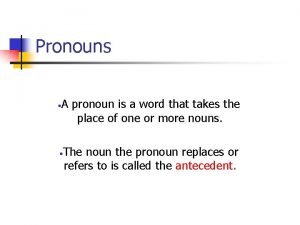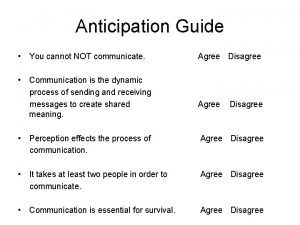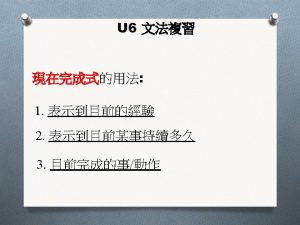A person who has not studied German can














- Slides: 14

A person who has not studied German can form no idea of what a perplexing language it is: [. . . ] Mark Twain

The Germans have a kind of parenthesis, which they make by splitting a verb in two and putting half of it at the beginning of an exciting chapter and the other half at the end of it. Can any one conceive of anything more confusing than that? These things are called ‘separable verbs’. The German grammar is blistered all over with separable verbs; and the wider the two portions of one of them are spread apart, the better the author of the crime is pleased with his performance. A favourite one is reiste ab, which means departed. Here is an example which I culled from a novel and reduced to English:

“The trunks now being now ready, he de- after kissing his mother and sisters, and once more pressing to his bosom his adored Gretchen, who, dressed in simple white muslin, with a single tuberose in the ample folds of her rich brown hair, had tottered feebly down the stairs, still pale from the terror and excitement of the past evening, but longing to lay her poor aching head yet once again upon the breast of him whom she loved more dearly than life itself, parted. ”

PREFIXES • INSEPARABLE PREFIXES • SEPARABLE PREFIXES forget = vergessen receive = bekommen understand = verstehen mißverstehen abfahren = drive off mitbringen = bring along anrufen = call (up)

SEPARABLE PREFIXES to depart = abfahren = to drive off = (ab+fahren) Meine Eltern fahren morgen früh nach Florida ab. to bring along = mitbringen ( mit+ bringen) Er bringt seine Freundin zur Party mit.

SEPARABLE PREFIXES ab an auf aus ein her hin mit um weg weiter zu zurück • • • • off, away on, at up, open out of (prefix) “in” toward away with, along indicating change away further, continue to, closed back

SEPARABLE PREFIXES ab an auf zu aus ein her hin mit um weg weiter zurück • • • [Abkommen] ankommen aufkommen auskommen [Einkommen] her / hinkommen mitkommen umkommen wegkommen weiterkommen zurückkommen

SEPARABLE PREFIXES ab auf aus her mit um weg weiter zurück an zu ein hin • • kommen gehen laufen machen fahren nehmen bringen ….

CONJUGATION Personal Pronouns: • ich • du • er, sie, es Infinitive: anrufen • rufe … an • rufst … an • ruft … an • wir • ihr • sie • rufen … an • ruft … an • rufen … an


PREFIXES • HIN • HER indicates a movement away from the speaker towards somewhere else It is often used in conjunction with another prefixes like indicates a movement towards the speaker from somewhere It is often used in conjunction with another prefixes like auf - aus - ein - unter

EXAMPLES • hineingehen • Er geht in das Haus hinein. (I am outside and he goes in) • herauskommen • Er kommt aus dem Haus heraus. ( I am outside and comes out)

EXAMPLES • hinausfahren • Er fährt hinaus. • Er fährt herausfahren • heraufkommen herunterkommen • Er kommt herauf. • Er kommt herunter

Der Abend ist lustig. Viele Studenten kommen aus der “Axe” heraus. Sie gehen in die Nacht hinaus. Sie möchten den Berg hinaufsteigen, aber sie kommen sehr schlecht hinauf oder hinunter Die “Axe” macht jetzt zu. Viele Studenten fahren morgen wieder hin und gehen hinein.
 You cannot improve what you cannot measure explain
You cannot improve what you cannot measure explain Low german vs high german
Low german vs high german 1 person plural
1 person plural First and second person
First and second person Person person = new person()
Person person = new person() First person second person third person chart
First person second person third person chart Kind of quantitative research
Kind of quantitative research To understand and interpret social interactions
To understand and interpret social interactions If you had studied hard you wouldn't failed the exam
If you had studied hard you wouldn't failed the exam Uncontrolled, lacking in restraint
Uncontrolled, lacking in restraint You cannot not communicate
You cannot not communicate Did you finish doing your homework
Did you finish doing your homework Undefined status sociology definition
Undefined status sociology definition The most studied group is
The most studied group is Has + ving
Has + ving



























